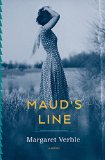Write your own review!
Marion C. (Litchfield, NH)
Determination
Maud's Line is a rich novel of the life of an eighteen-year-old Cherokee Indian living with her family on a U.S. Government allotment in 1928 Oklahoma. Like all poor girls, she dreams of colorful dresses, mirrors, running water—all the things she reads about in books.
When a white peddler comes to town, Maud flirts with him with the idea she will leave town with him and sample that rich life. Maud does not understand the peddler's customs. Why will he not take her with him? Do the morals of the honest white man interfere with the beliefs of the good Cherokee girl?
Maud's Line is well written and very informative about Cherokee lore. I look forward to Margaret Verble's next novel.
Deborah J. (Cody, WY)
Maud's Line
I really enjoyed this book. The beginning chapter was a bit slow and the characterizations difficult to follow but I'm glad I stuck with it. It is a great story of love of all kinds, hard work, overcoming adversity and last but not least, courage. It was a very informative piece of historical fiction that anyone interested in Native American history would enjoy. It would lend itself to great discussions amid a book club.
Amy M. (Southlake, TX)
Maud's Line
Thank you to Book Browse for the ARC of Maud's Line. Growing up in the Tulsa, Oklahoma area and hearing and reading stories of the Cherokee Indians and their lives, made this book special to me. Maud, an 18 year old Cherokee Indian, grew up in 1928 without her mother and had to spend her days caring for her odd brother, Lovely, and irritable father, Mustard. Although resolved to successfully run the farm and care for her menfolk, a handsome peddler, Booker, turns her thoughts and her heart towards a different life. Love, murder, illness, and family challenges fill this book with how much courage it took to survive life on a farm during this time period. This book will remind you of the courage seen in the settlers of My Antonia by Willa Cather.
Rose N. (Saginaw, MI)
Maud's Line
The amazing, hard-working, passionate heroine of this novel, Maud Nail, is truly an inspiration for modern eighteen-year-old girls. In addition to farming the land and caring for the animals on her small Indian allotment in 1920's Oklahoma, Maud spends her 'leisure time' reading classic literary works. I so enjoyed learning about her extended Indian family: their love, their habits, their caring closeness. This is a novel which could be discussed and shared by booklovers anywhere..
Kim B. (Bay City, MI)
Not what I expected.
Maud's Line was an enjoyable story. I was expecting an historical fiction novel. The historical references were dubious and did not come close to living up to the promotion on the back cover of the book.
I was looking forward to learning more about the land allotments, treatment of native Americans, and the conditions in which they lived. How the federal and state governments played a role in the lives of those who remained behind after the trail of tears.
Again, it was a good story, easy to read and follow. I believe people will enjoy meeting Maud and her family and be entertained but not edified.
The ending was weak and predictable and for this reason a little disappointing.
Cynthia A. (Grand Rapids, MI)
MAUD'S LINE
At first, I did not think I would like this book. But once I got into it, I didn't want to put it down.
I especially liked reading how Maud plodded through every situation thrown at her.
The characters were so real. They could have been my neighbors.
The story was so true to life.
I really enjoyed this book.
Mary B. (Glastonbury, CT)
Just OK
Maud is a young Cherokee woman living in 1928 Oklahoma with her alcoholic father and sensitive brother. (Her mother died of a snake bite years ago.) I think the title refers to the lines Maud walks in the book, including the literal lines between land allotments, the lines between childhood and adulthood, between the life she has now and the life she wants (complete with electricity, indoor plumbing, education), and primarily the line between the two lovers in her life, one white and one Indian. I was surprised that the author did not describe more of the tensions between the whites and the Indians, as surely a relationship between an 18 year old Cherokee woman and a 30ish white man would cause a stir in 1928?
I would describe the author's writing style as wordy and unpolished. The quote on the book's cover comparing her to Louise Erdrich is a huge leap. I also agree with other reviewers that the extensive pages devoted to Maud's sex life in the last half of the book seemed completely out of place and unnecessary.
Darra W. (Mendocino, CA)
Disappointing . . .
Based on its subject matter, I had high hopes for this first novel, but sadly, I must agree with those previous reviewers who felt the book lacked depth. It seems that in her eagerness to tell the story, the author skimped on character and thematic development. The ending, also, felt like a "cop out." Just not for me, I guess.




